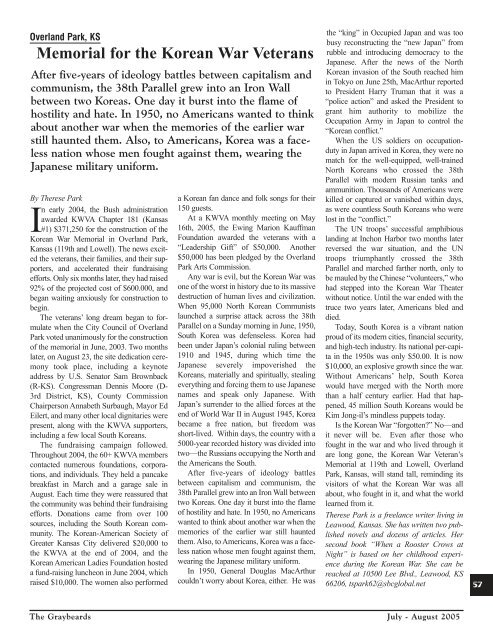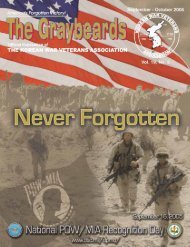National convention, october 2-5, 2005, in bossier - Korean War ...
National convention, october 2-5, 2005, in bossier - Korean War ...
National convention, october 2-5, 2005, in bossier - Korean War ...
Create successful ePaper yourself
Turn your PDF publications into a flip-book with our unique Google optimized e-Paper software.
Overland Park, KS<br />
Memorial for the <strong>Korean</strong> <strong>War</strong> Veterans<br />
After five-years of ideology battles between capitalism and<br />
communism, the 38th Parallel grew <strong>in</strong>to an Iron Wall<br />
between two Koreas. One day it burst <strong>in</strong>to the flame of<br />
hostility and hate. In 1950, no Americans wanted to th<strong>in</strong>k<br />
about another war when the memories of the earlier war<br />
still haunted them. Also, to Americans, Korea was a faceless<br />
nation whose men fought aga<strong>in</strong>st them, wear<strong>in</strong>g the<br />
Japanese military uniform.<br />
By Therese Park<br />
In early 2004, the Bush adm<strong>in</strong>istration<br />
awarded KWVA Chapter 181 (Kansas<br />
#1) $371,250 for the construction of the<br />
<strong>Korean</strong> <strong>War</strong> Memorial <strong>in</strong> Overland Park,<br />
Kansas (119th and Lowell). The news excited<br />
the veterans, their families, and their supporters,<br />
and accelerated their fundrais<strong>in</strong>g<br />
efforts. Only six months later, they had raised<br />
92% of the projected cost of $600.000, and<br />
began wait<strong>in</strong>g anxiously for construction to<br />
beg<strong>in</strong>.<br />
The veterans’ long dream began to formulate<br />
when the City Council of Overland<br />
Park voted unanimously for the construction<br />
of the memorial <strong>in</strong> June, 2003. Two months<br />
later, on August 23, the site dedication ceremony<br />
took place, <strong>in</strong>clud<strong>in</strong>g a keynote<br />
address by U.S. Senator Sam Brownback<br />
(R-KS). Congressman Dennis Moore (D-<br />
3rd District, KS), County Commission<br />
Chairperson Annabeth Surbaugh, Mayor Ed<br />
Eilert, and many other local dignitaries were<br />
present, along with the KWVA supporters,<br />
<strong>in</strong>clud<strong>in</strong>g a few local South <strong>Korean</strong>s.<br />
The fundrais<strong>in</strong>g campaign followed.<br />
Throughout 2004, the 60+ KWVA members<br />
contacted numerous foundations, corporations,<br />
and <strong>in</strong>dividuals. They held a pancake<br />
breakfast <strong>in</strong> March and a garage sale <strong>in</strong><br />
August. Each time they were reassured that<br />
the community was beh<strong>in</strong>d their fundrais<strong>in</strong>g<br />
efforts. Donations came from over 100<br />
sources, <strong>in</strong>clud<strong>in</strong>g the South <strong>Korean</strong> community.<br />
The <strong>Korean</strong>-American Society of<br />
Greater Kansas City delivered $20,000 to<br />
the KWVA at the end of 2004, and the<br />
<strong>Korean</strong> American Ladies Foundation hosted<br />
a fund-rais<strong>in</strong>g luncheon <strong>in</strong> June 2004, which<br />
raised $10,000. The women also performed<br />
a <strong>Korean</strong> fan dance and folk songs for their<br />
150 guests.<br />
At a KWVA monthly meet<strong>in</strong>g on May<br />
16th, <strong>2005</strong>, the Ew<strong>in</strong>g Marion Kauffman<br />
Foundation awarded the veterans with a<br />
“Leadership Gift” of $50,000. Another<br />
$50,000 has been pledged by the Overland<br />
Park Arts Commission.<br />
Any war is evil, but the <strong>Korean</strong> <strong>War</strong> was<br />
one of the worst <strong>in</strong> history due to its massive<br />
destruction of human lives and civilization.<br />
When 95,000 North <strong>Korean</strong> Communists<br />
launched a surprise attack across the 38th<br />
Parallel on a Sunday morn<strong>in</strong>g <strong>in</strong> June, 1950,<br />
South Korea was defenseless. Korea had<br />
been under Japan’s colonial rul<strong>in</strong>g between<br />
1910 and 1945, dur<strong>in</strong>g which time the<br />
Japanese severely impoverished the<br />
<strong>Korean</strong>s, materially and spiritually, steal<strong>in</strong>g<br />
everyth<strong>in</strong>g and forc<strong>in</strong>g them to use Japanese<br />
names and speak only Japanese. With<br />
Japan’s surrender to the allied forces at the<br />
end of World <strong>War</strong> II <strong>in</strong> August 1945, Korea<br />
became a free nation, but freedom was<br />
short-lived. With<strong>in</strong> days, the country with a<br />
5000-year recorded history was divided <strong>in</strong>to<br />
two—the Russians occupy<strong>in</strong>g the North and<br />
the Americans the South.<br />
After five-years of ideology battles<br />
between capitalism and communism, the<br />
38th Parallel grew <strong>in</strong>to an Iron Wall between<br />
two Koreas. One day it burst <strong>in</strong>to the flame<br />
of hostility and hate. In 1950, no Americans<br />
wanted to th<strong>in</strong>k about another war when the<br />
memories of the earlier war still haunted<br />
them. Also, to Americans, Korea was a faceless<br />
nation whose men fought aga<strong>in</strong>st them,<br />
wear<strong>in</strong>g the Japanese military uniform.<br />
In 1950, General Douglas MacArthur<br />
couldn’t worry about Korea, either. He was<br />
the “k<strong>in</strong>g” <strong>in</strong> Occupied Japan and was too<br />
busy reconstruct<strong>in</strong>g the “new Japan” from<br />
rubble and <strong>in</strong>troduc<strong>in</strong>g democracy to the<br />
Japanese. After the news of the North<br />
<strong>Korean</strong> <strong>in</strong>vasion of the South reached him<br />
<strong>in</strong> Tokyo on June 25th, MacArthur reported<br />
to President Harry Truman that it was a<br />
“police action” and asked the President to<br />
grant him authority to mobilize the<br />
Occupation Army <strong>in</strong> Japan to control the<br />
“<strong>Korean</strong> conflict.”<br />
When the US soldiers on occupationduty<br />
<strong>in</strong> Japan arrived <strong>in</strong> Korea, they were no<br />
match for the well-equipped, well-tra<strong>in</strong>ed<br />
North <strong>Korean</strong>s who crossed the 38th<br />
Parallel with modern Russian tanks and<br />
ammunition. Thousands of Americans were<br />
killed or captured or vanished with<strong>in</strong> days,<br />
as were countless South <strong>Korean</strong>s who were<br />
lost <strong>in</strong> the “conflict.”<br />
The UN troops’ successful amphibious<br />
land<strong>in</strong>g at Inchon Harbor two months later<br />
reversed the war situation, and the UN<br />
troops triumphantly crossed the 38th<br />
Parallel and marched farther north, only to<br />
be mauled by the Ch<strong>in</strong>ese “volunteers,” who<br />
had stepped <strong>in</strong>to the <strong>Korean</strong> <strong>War</strong> Theater<br />
without notice. Until the war ended with the<br />
truce two years later, Americans bled and<br />
died.<br />
Today, South Korea is a vibrant nation<br />
proud of its modern cities, f<strong>in</strong>ancial security,<br />
and high-tech <strong>in</strong>dustry. Its national per-capita<br />
<strong>in</strong> the 1950s was only $50.00. It is now<br />
$10,000, an explosive growth s<strong>in</strong>ce the war.<br />
Without Americans’ help, South Korea<br />
would have merged with the North more<br />
than a half century earlier. Had that happened,<br />
45 million South <strong>Korean</strong>s would be<br />
Kim Jong-il’s m<strong>in</strong>dless puppets today.<br />
Is the <strong>Korean</strong> <strong>War</strong> “forgotten?” No—and<br />
it never will be. Even after those who<br />
fought <strong>in</strong> the war and who lived through it<br />
are long gone, the <strong>Korean</strong> <strong>War</strong> Veteran’s<br />
Memorial at 119th and Lowell, Overland<br />
Park, Kansas, will stand tall, rem<strong>in</strong>d<strong>in</strong>g its<br />
visitors of what the <strong>Korean</strong> <strong>War</strong> was all<br />
about, who fought <strong>in</strong> it, and what the world<br />
learned from it.<br />
Therese Park is a freelance writer liv<strong>in</strong>g <strong>in</strong><br />
Leawood, Kansas. She has written two published<br />
novels and dozens of articles. Her<br />
second book “When a Rooster Crows at<br />
Night” is based on her childhood experience<br />
dur<strong>in</strong>g the <strong>Korean</strong> <strong>War</strong>. She can be<br />
reached at 10500 Lee Blvd., Leawood, KS<br />
66206, tspark62@sbcglobal.net<br />
57<br />
The Graybeards<br />
July - August A<br />
<strong>2005</strong>

















